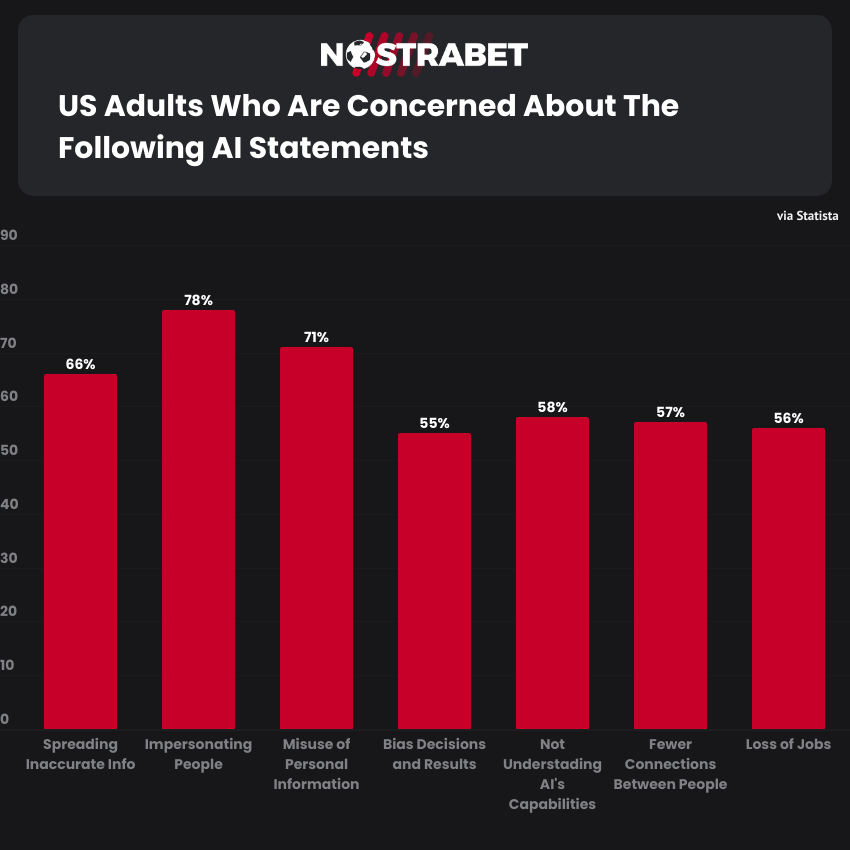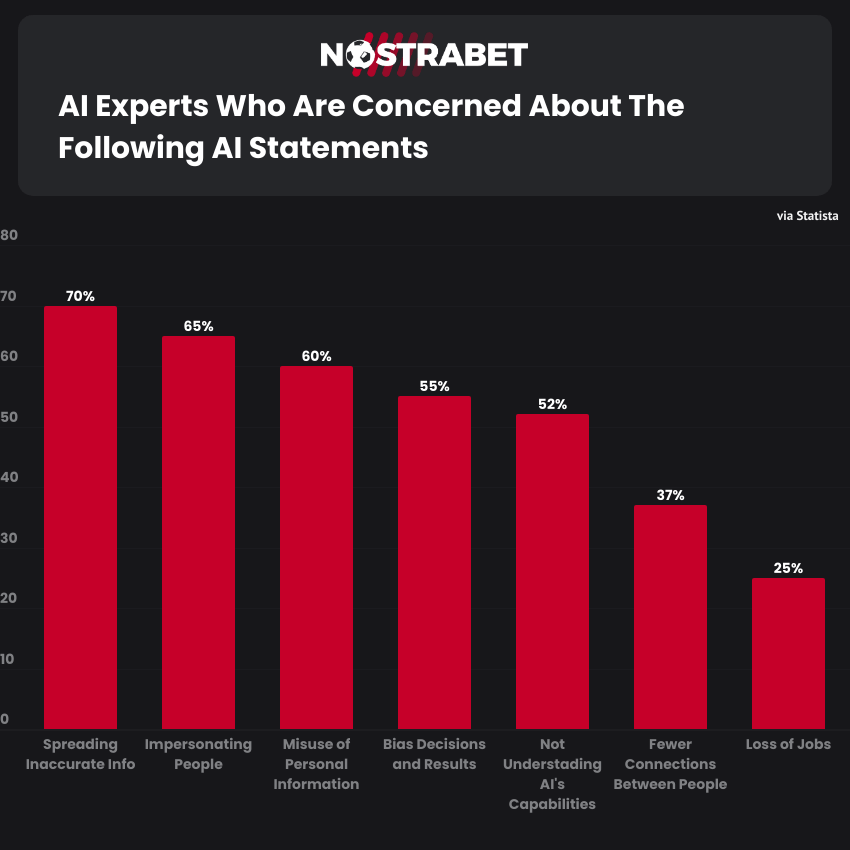
If there is one thing that changed the way we interact with the internet and our devices, it has to be AI. Nowadays, people have access to all kinds of AI tools they can use daily. Both businesses and individuals rely on AI daily, and the number of people using this tech will continue to grow.
Having said that, Nostrabet.com reports that both people and AI experts are concerned about certain things related to AI. Despite the fact that the new tech is beneficial, there are instances where it can lead to problems. Some are more troublesome than others, so let’s learn more about everything.


AI & Inaccurate Information
People use AI for many things, one of which is to find more information about something. Whether they are doing a project or want to learn more about a given aspect, AI can help them get that information much faster.
Assuming that the details you can learn are accurate, AI is an excellent tool that saves tons of time. However, there are some cases where the tech provides inaccurate information, which is what people fear.
According to the studies, 66% of US adults are very concerned about that. Some would expect AI experts to have a more positive view of the situation, but the percentage there is even higher – 70%. This is a clear sign that there is an ongoing problem with some AI models and the information they can provide.
Giving people access to inaccurate information can have serious consequences, especially for niches like sports betting, for example. Many people rely on AI to help them create their bets by recommending markets and matches to bet on. Others will use AI to get the latest information about their favorite players and teams, but if that information is false, people will make bad decisions and wager on something they would not usually choose.
Impersonating people
Everyone who has used some of the more popular AI models has probably noticed that the algorithm often tries to impersonate people. This usually happens when your prompts are written in a specific way that triggers such a response. However, there are AI models that will try to impersonate someone’s writing style and tone just because they can.
This can definitely be scary, and it seems like 78% of US adults agree with it. The percentage among AI experts is lower at 65%, but high enough to make you think twice before using any AI model.
Impersonating people may not be that dangerous yet, but considering the way things are going, it will probably become a bigger issue in the future. Nowadays, there are AI bots that sound like humans when talking, and they try to sell you different things over the phone.
Misuse of personal information
One of the downsides of the digital era is the fact that someone can have access to our personal information. Even though some AI models are designed to help companies store that data, this doesn’t happen all the time. In fact, the AI models themselves can often misuse the data for different purposes.
The studies show that 71% of US adults are very concerned about that, whereas the percentage among AI experts is 60%. There are many instances where AI has misused people’s private data, especially on iGaming platforms. Some of them use sophisticated AI models to encrypt that information, but instead of keeping it safe, the AI model often reveals it to third parties. That is why learning more about the site you want to use and what it provides is crucial.
Bias decisions and results
One of the advantages of using AI for different tasks is that it should be unbiased and help you make the right decisions. This is mostly true, however, there have been instances where the AI model clearly makes biased decisions. This is especially true in online betting and when you ask it to evaluate specific teams, players, competitions, or even iGaming sites as a whole.
According to the most recent study, 55% of AI experts and US adults are worried about these kinds of decisions. I am not surprised by what most people think, but the fact that AI experts share the same opinion is worrying, to say the least. AI has been around for some time now, and most people would expect those kinds of responses to be “fixed,” but it seems this is not the case.
Not understanding what AI can do
Although AI is not new (it has been around for years), many people do not even use it. Some who occasionally use it have no idea what it does or how they can take advantage of it. This often leads to many missed opportunities and/or problems.
The real issue with people not understanding what AI can do is that some of them can get into trouble because of it. Consequently, 58% of US adults are very worried about the fact, whereas 52% of AI experts share that opinion.
Not understanding what AI can do could seriously affect people, especially those unfamiliar with the digital age. As mentioned, there are scammers who use AI to try to “sell” a product or a service over the phone. AI is also often involved in many different online scams related to wanting credit card information, personal details, or something else.
Using AI leads to fewer connections between people
It is no secret that the internet has changed how we talk and communicate. Social media has billions of users and they have already changed the way we connect with our family and friends. Now that AI is regularly available, things are about to become even more difficult and most people seem to agree.
Based on the information, 57% of US adults are very concerned about this fact, and for a good reason. Many of them already prefer meeting and talking online, so now that they can actually talk to AI about anything, some people will have even fewer contacts with other human beings.
Interestingly, only 37% of AI experts share the same opinion. They believe that most people will be able to separate both and will not allow AI to affect their connections with others. It will be interesting to see if this will be the case, but considering how social media changed everything, AI will most likely do the same.
AI leading to the loss of jobs
Last but not least, we have the job situation with AI. People have been talking about this for years prior to the arrival of the most popular AI models. Now that they are here, we already have examples of people losing their jobs because of it.
Considering that, it is no surprise that 56% of US adults are very concerned about the situation. They believe that AI can take many people’s jobs away from them. Employers can use AI to cut down their labor costs and get the same or even better results, depending on the industry.
With that said, AI experts seem to have a different opinion because only 25% of them are very concerned about it. There is no arguing that AI could impact some people, however, most of them think that AI can enhance employees, not take their jobs.
Going back to what we mentioned earlier, most people don’t even understand what AI can do. Once that changes, they will implement it more into their daily lives and take advantage of everything it offers.
AI and the future of the betting industry
Tons of businesses use AI daily for various things, and some iGaming operators are among them. Players with experience with bookies and casinos that rely on AI know the new tech has many advantages. For example, some AI models enhance the given site’s security features.
Alongside that, a lot of companies use AI for their customer support services. Almost all operators have some kind of AI assistant implemented, and users only contact a real customer support agent if the AI model can’t answer their questions.
Some big bookmakers and casinos rely on AI to create new markets, casino games, and bonuses. Their number is not that high yet, but we expect this to change in the next couple of years.
Closing Thoughts
Whether we like it or not, AI is here to stay, and we need to get used to its capabilities. However, we expect some serious regulations in this department in the future, especially regarding the job department. AI can indeed replace a lot of people, but this will have a significant impact on the economy, so we wouldn’t be surprised if governments create new regulations regarding AI’s usage and implementation.


No comments added yet. Be the first!